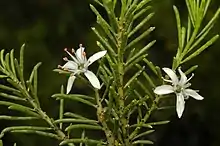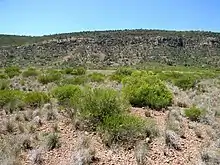| Rock wallaby shrub | |
|---|---|
 | |
| In Gundabooka National Park | |
| Scientific classification | |
| Kingdom: | Plantae |
| Clade: | Tracheophytes |
| Clade: | Angiosperms |
| Clade: | Eudicots |
| Clade: | Rosids |
| Order: | Sapindales |
| Family: | Rutaceae |
| Genus: | Philotheca |
| Species: | P. linearis |
| Binomial name | |
| Philotheca linearis | |
| Synonyms[1] | |
| |

Philotheca linearis, commonly known as the rock wallaby shrub[2] or narrow-leaf wax-flower,[3] is a species of flowering plant in the family Rutaceae and is endemic to an inland areas of southern Australia. It is a shrub with glandular-warty branchlets and leaves, club-shaped to cylindrical leaves and white flowers arranged singly in leaf axils.
Description
Philotheca linearis is a shrub that grows to a height of 0.5–2 m (1 ft 8 in – 6 ft 7 in) with warty glands on the branchlets. The leaves are also glandular-warty, club-shaped to cylindrical, 8–20 mm (0.31–0.79 in) long and channelled on the upper surface. The flowers are borne singly in leaf axils, each flower on a pedicel 4–6 mm (0.16–0.24 in) long. There are five broadly egg-shaped sepals about 1 mm (0.039 in) long and five elliptical white petals 4–6 mm (0.16–0.24 in) long. The ten stamens are free from each other and hairy. Flowering mainly occurs in spring and the fruit is about 5 mm (0.20 in) long and prominently beaked.[2][4][5]
Taxonomy
This philotheca was first formally described in 1837 by Stephan Endlicher from an unpublished description by Allan Cunningham who gave it the name Eriostemon linearis. Endlicher published the description in the Enumeratio plantarum quas in Novae Hollandiae ora austro-occidentali ad fluvium Cygnorum et in sinu Regis Georgii collegit Carolus Liber Baro de Hügel.[6] The type specimens were collected by Cunningham on the "Barren Ranges on the Lachlan River" in June 1817.[7] In 1998, Wilson changed the name to Philotheca linearis in the journal Nuysia.[8][9]
Distribution and habitat
Philotheca linearis on and around rock outcrops from the Great Victoria Desert in Western Australia and east to the Everard, Gawler and Flinders Ranges in South Australia and the Cobar – Bourke – Broken Hill area of New South Wales.[2][4]
Conservation status
In Western Australia, P. linearis is classified as "Priority One" by the Government of Western Australia Department of Parks and Wildlife,[5] meaning that it is known from only one or a few locations which are potentially at risk.[10]
References
- 1 2 "Philotheca linearis". Australian Plant Census. Retrieved 6 August 2020.
- 1 2 3 Wilson, Paul G.; Wilson, Annette J.G. (ed.) (2013). Flora of Australia (Volume 26). Canberra: Australian Biological Resources Study. pp. 374–375. Retrieved 6 August 2020.
{{cite book}}:|first2=has generic name (help) - ↑ "Philotheca linearis (Rutaceae) Narrow-leaf wax-flower". South Australian Seed Conservation Service. Retrieved 6 August 2020.
- 1 2 Weston, Paul H.; Harden, Gwen J. "Philotheca linearis". Royal Botanic Garden Sydney. Retrieved 6 August 2020.
- 1 2 "Philotheca linearis". FloraBase. Western Australian Government Department of Biodiversity, Conservation and Attractions.
- ↑ Endlicher, Stephan (1837). Enumeratio plantarum quas in Novae Hollandiae ora austro-occidentali ad fluvium Cygnorum et in Sinu Regis Georgii collegit Carolus liber baro de Hügel. p. 16. Retrieved 6 August 2020.
- ↑ "Eriostemon linearis". APNI. Retrieved 6 August 2020.
- ↑ "Philotheca linearis". APNI. Retrieved 6 August 2020.
- ↑ Wilson, Paul G. (1998). "A Taxonomic Review of the genera Eriostemon and Philotheca". Nuytsia. 12 (2): 253. Retrieved 6 August 2020.
- ↑ "Conservation codes for Western Australian Flora and Fauna" (PDF). Government of Western Australia Department of Parks and Wildlife. Retrieved 6 August 2020.